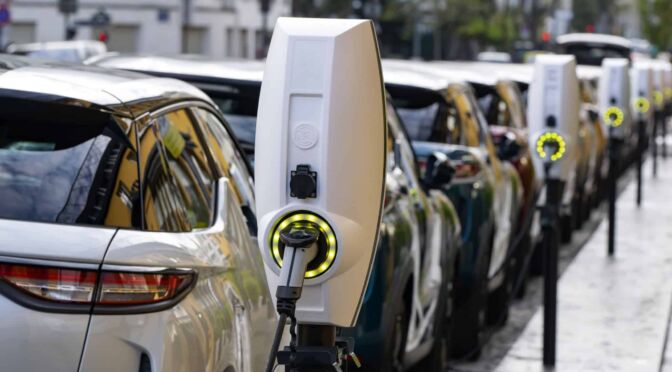
Is it Time to Switch to an Electric Vehicle?
Gas prices have been big news lately, but the story is a familiar one – prices are going up. When gas prices go up, more people start to consider whether an electric vehicle (EV) makes more financial sense.
Some would argue that electricity rates have also increased, so that offsets the savings. But does it make that big of a difference? Which vehicle would actually be more cost effective in the short-term and long-run? And these costs aren’t the only factors to consider when you’re trying to decide if it’s time to make the switch to an electric vehicle.
Let’s go over how to calculate the cost of driving a gas-powered vehicle vs an electric vehicle to decide which one is going to be the most affordable.
Calculating the Driving Costs for Electric Vehicles vs Gas-Powered Vehicles
Will you pay more or less for electricity to drive the same number of miles that you would get with a gallon of gas? To determine whether a gas-powered vehicle or an electric vehicle will be less expensive to drive you have to look at more than how the cost of electricity compares to gasoline.
You’ll need fives pieces of information to calculate and compare driving costs:
- The average cost of a gallon of gasoline in your city
- The price per kWh for your energy plan
- The miles per gallon for the gas-powered vehicle
- The MPGe for the electric-powered vehicle
- How many miles you drive a month
Gas prices are pretty straightforward. Gas stations clearly state the price per gallon. You also probably already know how many miles per gallon your gas-powered vehicle gets.
Calculating the cost per mile for an electric vehicle (EV) is a little more complex. The Environmental Protection Agency (EPA) came up with a way to express miles per gallon for an electric vehicle to make comparisons a little simpler. However many miles an EV can go on 33.7 kWh is it’s MPGe. The EPA determined 33.7 kWh contains the same amount of energy content as a gallon of gas.
So, if an EV gets 50 MPGe that would be like a gas-powered vehicle getting 50 MPG.
But that still won’t tell you which is cheaper. Even if the MPGe for an electric vehicle is twice as much as the MPG for a gas-powered vehicle, that doesn’t necessarily mean it’s cheaper. That’s why you have to know the average cost of a gallon of gas and your cost per kWh for electricity.
So, how much does it cost to charge an electric car?
Let’s take a look at an example to figure out which vehicle would cost less to drive.
EV With 100 MPGe vs Gas-Powered Vehicle With 25 MPG
The kilowatt-hour rate is $0.15
The average cost for a gallon of gas is $4.70
1,000 miles driven in a month
Electric Vehicle Monthly Cost
1,000 miles / 100 MPGe = 337 kWh a month (10 x 33.7 kWh)
$0.15 x 337 kWh = $50.55 in electricity a month
Gas-Powered Vehicle Monthly Cost
1,000 miles / 25 MPG = 40 gallons of gas a month
$4.70 gallon x 40 gallons = $188 month in gas
In this scenario, the EV is the clear winner in terms of the monthly cost to go 1,000 miles. Of course, there are a lot of variables, and this is just one example with conservative averages. If the gas-powered vehicle got 35 miles a gallon and gas was $3.00 a gallon the monthly costs would be much closer. An electric vehicle is going to add to your electric bill, but not having to fuel up at a gas station means you’re likely going to save money overall.
One thing to know is that good MPGe doesn’t necessarily mean an EV will have a good range on a full charge. The MPGe is a measure of how efficiently an EV uses energy not capacity. So if you need to drive long distances on a regular basis don’t rely on the MPGe.
The range of electric vehicles
One of the biggest questions is the range of an electric car. How far an electric car goes depends on various factors. Including the car’s MPGe, the size of an electric car’s battery, the age of the car, the owners driving style, and the weather conditions.
Potential for Future Increase in Costs
Something to keep in mind is that you have next to no control over the cost of gasoline. It’s a very volatile global commodity that can go up or down in price at any time. Right now, it’s expected that gas prices will eventually come back down, but the overall trend has been that the cost is going up collectively.
On the other hand, you can lock in electricity rates with a fixed-rate energy plan. Fixed-rate means that the cost per kilowatt-hour doesn’t change. Plans are typically 12+ months long and can sometimes be renewed. Variable rate electricity plans are susceptible to potential price increases.
Other Factors to Consider
There are a few more things that you’ll want to factor into the cost of owning an EV that can impact how much it costs to power up and drive.
State Electric Vehicle Tax Incentives
A number of states offer their own electric vehicle tax incentives. The incentives can be for the vehicle itself or the charging equipment that powers them up. The savings could be enough to completely offset the cost of the electricity used to power the EV. The best way to find out if your state offers EV tax incentives is by using the DSIRE database.
DSIRE was created by the N.C. Clean Energy Technology Center to give consumers an easy way to look up energy-related tax incentives for any state. Just click on your state and you’ll get a rundown of state and federal incentives.
One thing to keep in mind is that, like the federal tax credit, there are limitations and it’s often a one-time thing. The tax incentives may be spread out over a number of years, but usually, they are lower with each passing year. To factor state incentives into the cost of ownership, calculate how much the incentives are worth in total over time. You can then divide the total by the number of years you expect to own the vehicle to calculate the yearly and monthly savings.
The advantage of switching to an electric vehicle
Switching to an electric vehicle can benefit people and the environment for years to come by reducing air pollution and greenhouse gas emissions.
Free EV Charging Stations
There are a lot of government buildings and private businesses that have added EV charging stations to their parking lots. Pull up to one of the charging spots and you may be able to refill your battery for free. Some EV manufacturers like Tesla also offer free charging at certain public stations.
Unless you regularly park for extended periods at a location with a free charger this shouldn’t be factored into the cost comparison because free charging will be too sporadic. However, if you calculate the costs and they’re close to even, free charging stations can give EV ownership the edge since there’s potential to lower the cost.
Home Charging Stations for EV’s
A wallbox installation is one of the most typical solutions to the issue of home charging an electric vehicle. The price of the wallbox will depend on your choice. However, grants and manufacturer discounts are available to assist users when they buy an EV. The best part is that, once you have a wallbox, it will function with most electric vehicles, allowing other EV owners to charge as well.
Federal Electric Vehicle Tax Credit
EVs have a distinct edge over gas-powered vehicles – the federal tax credit. If you buy a new electric vehicle you’ll get a tax credit of up to $7,500. New hybrid vehicles can qualify for $1,875 to $7,500 in tax credits.
If you plan to keep your next vehicle for 10 years that would be an annual savings of $750 for an EV. While this isn’t directly tied to the monthly cost of driving an EV, it is definitely a consideration if you’re in the market for a new vehicle.
With Spark Energy, it’s easy to calculate costs because we offer reliable fixed-rate energy plans. You’ll know exactly how much each mile will cost when you power up at home with us. Check to see if Spark Energy plans are available in your area.



